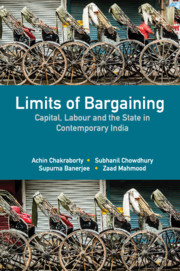Book contents
- Frontmatter
- Contents
- List of Tables
- List of Figures
- Preface
- 1 Contextualising Trade Unions and Collective Bargaining
- 2 Collective Bargaining in India: An Overview
- 3 Everyday Processes of Collective Bargaining in West Bengal
- 4 Industrial Stagnation due to ‘Labour Militancy’? A Critical Look at the Macro Evidence
- 5 Trade Unions and Working-Class Politics in Contemporary West Bengal
- 6 The State and Collective Bargaining
- 7 Conclusion
- References
- Index
3 - Everyday Processes of Collective Bargaining in West Bengal
Published online by Cambridge University Press: 05 June 2019
- Frontmatter
- Contents
- List of Tables
- List of Figures
- Preface
- 1 Contextualising Trade Unions and Collective Bargaining
- 2 Collective Bargaining in India: An Overview
- 3 Everyday Processes of Collective Bargaining in West Bengal
- 4 Industrial Stagnation due to ‘Labour Militancy’? A Critical Look at the Macro Evidence
- 5 Trade Unions and Working-Class Politics in Contemporary West Bengal
- 6 The State and Collective Bargaining
- 7 Conclusion
- References
- Index
Summary
In the last chapter, we have discussed the various strands of literature on collective bargaining, delineating the two contradictory strands of argument—one pointing out that collective bargaining is a relic of the past, while the other indicating its increased relevance, albeit with a change in its form. In this chapter, we look at the processes of collective bargaining in West Bengal (WB) and try to see how these two trends play out in this context. Our interrogation of collective bargaining in WB, however, is rather on a different plane as compared with the existing literature. On the one hand, the literature on collective bargaining has largely been outcome-based, studying agreements between management and trade union or labour and capital, as the mechanism to understand the nature of collective bargaining. On the other hand, the study of labour has focused on labour activism—organising the workers in protest against the management or the state. Between these two spectra lies the entire terrain of the everyday—a space which has largely been ignored in the study of collective bargaining (for example, Sen 2009).
We argue that collective bargaining cannot be understood simply as a moment in time actualised through an agreement. Rather, the agreement can be thought of as the end of a process of everyday negotiations and struggles between capital, labour and its unions, and the state. Indeed, a study of these agreements, the issues they raise, the concessions granted to labour and the commitments of the management are important sources of information to understand the issues on which bargaining happened between labour and capital. But in order to understand the processes, the negotiations, and the struggles between labour and capital, we need to move beyond the agreements and study the everyday processes that shape collective bargaining and the resultant agreements. Moreover, to treat the agreement as the end of the collective bargaining is also incomplete. Often, their actual implementation remains a source of constant dispute between labour and capital, as we will see in this chapter.
- Type
- Chapter
- Information
- Limits of BargainingCapital, Labour and the State in Contemporary India, pp. 26 - 49Publisher: Cambridge University PressPrint publication year: 2019



